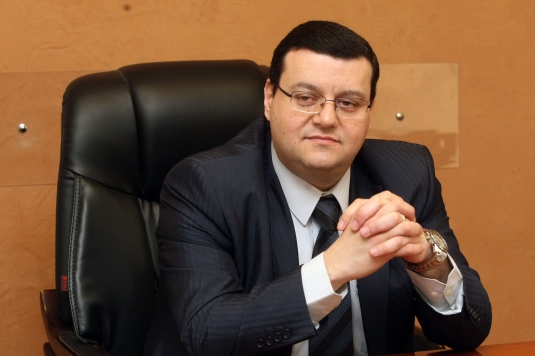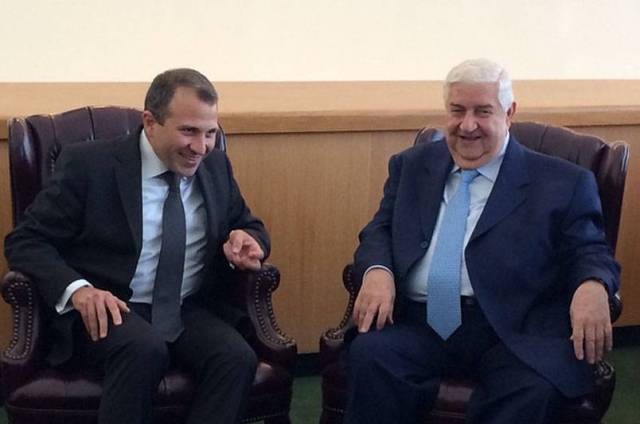The precarious balance of Lebanon’s foreign policy
Rami Rayess / The Arab Weekly
26 سبتمبر 2017

Little divides the Lebanese more than questions over foreign policy. Reeling from the effects of wars, occupation, sectarian division, embargo and boycott, the recent visit of Lebanese politicians to a Syrian trade fair risked forcing foreign policy questions on the Lebanese that few are ready to answer.
When the Lebanese earned their independence from the French in 1943, they created a foreign policy formula predicated on the maxim of “no east, no west.” Essentially, Lebanon’s goal was to place itself in the middle of the global milieu, avoiding clashes with regional or international powers.
Though successful for a few years, the formula proved fragile. Initial divisions over the country’s Arab identity were exacerbated by wars with Israel, Western interference within the country, the Baghdad Pact (later the Central Treaty Organisation) and the rise of Nasserism, which strained the Lebanese political consensus and culminated in the 1958 revolution.
Over the following decades, other events exacerbated divisions among the Lebanese regarding regional issues pressing on the country. The civil unrest of 1975 was partly an extension of an underlying uncertainty over Lebanon’s place in the region and the world, as was the Syrian military intervention of the following year and the international compromise that allowed for it.

The country recently hit a new low. After years of officially boycotting the Syrian regime, two Lebanese ministers visited Damascus to participate in an international trade fair and talk with their Syrian counterparts, bringing questions of Beirut’s conflicting relations with Syria and Saudi Arabia to the fore.
Though the visit was not officially approved by the Lebanese government or Prime Minister Saad Hariri, it happened. Lebanese Minister of Agriculture Ghazi Zaiter and Minister of Industry Hussein Hajj Hassan, of Hezbollah, were photographed under images of Syrian President Bashar Assad, who has led his country through the convulsions of civil war since 2011.
Lebanon’s relations with Syria have been rocky since the assassination of former Prime Minister Rafik Hariri in February 2005 led to the withdrawal of Syrian troops after 29 years of tutelage and control. Nevertheless, the regional axis of Syria, Iran, in alliance with Lebanon’s Hezbollah, backed by Moscow, considers it has tilted the balance to its favour. Recent talks of halting US support to Syrian opposition groups, which never matched expectations anyway, have reinforced that impression.
Given the momentum the regime appears to be gaining on the battleground, it’s conceivable that Damascus and its allies may feel themselves free to contemplate their relations with Lebanon more fully.
It’s equally conceivable that the Syrian regime might be considering revenge for its humiliating withdrawal from Lebanon in 2005. Damascus has form here. As recently as 2012, its role in a terrorist attack intended for the northern city of Tripoli was exposed. The prime suspect in the case was Syrian intelligence General Ali Mamlouk who, along with the former Lebanese minister Michel Samaha, was accused of smuggling explosives into Lebanon in his private car. Samaha is in jail but Mamlouk was never expedited to Lebanon.
Lebanon’s relations with Syria have always been problematic. With a wide range of parties inside Lebanon allied to Damascus, and often supported by Assad’s military ally Hezbollah, Damascus has enjoyed a disproportionate say in Beirut’s affairs. Nevertheless, other parties have equally close ties with other regional powers, such as Prime Minister Saad Hariri’s relations with Assad’s nemeses in Saudi Arabia.
Analogies between Syrian and Saudi roles in Lebanon are strained. On the one hand, Riyadh has supported the Lebanese state in reconstruction and financial stability for years, irrespective of Beirut’s alliances with its regional foes, Hezbollah. On the other, Damascus has dominated the country and its economy for almost 30 years.
Regional tensions between Iran and Saudi Arabia, seemingly hardwired into the Lebanese political scene, have yet to lead to any kind of explosion, physical or political. However, proxy wars have flourished throughout history. Lebanon has played host to many. Perhaps now it needs to fully consider its future.
 عن أمل جنبلاط المتجدد: لبنان يستحق النضال
عن أمل جنبلاط المتجدد: لبنان يستحق النضال
 صحافيون أم عرّافون!
صحافيون أم عرّافون!
 ماذا يجري داخل أروقة بيت الكتائب المركزي؟
ماذا يجري داخل أروقة بيت الكتائب المركزي؟


 عن الخرائط التي تُرسم والإتفاقات التي تتساقط!
عن الخرائط التي تُرسم والإتفاقات التي تتساقط!
 “الإنحراف في الحياة”/ بقلم كمال جنبلاط
“الإنحراف في الحياة”/ بقلم كمال جنبلاط
 هاشتاغ #صار_الوقت يحل أولاً في حلقة جنبلاط
هاشتاغ #صار_الوقت يحل أولاً في حلقة جنبلاط
 طاولة نقاش عن أزمة الصحافة في جامعة AUST
طاولة نقاش عن أزمة الصحافة في جامعة AUST
 عبدالله: ليظهر لنا وزير مكافحة الفساد حرصه في صفقات البواخر والفيول
عبدالله: ليظهر لنا وزير مكافحة الفساد حرصه في صفقات البواخر والفيول
 عبدالله: غريب أمر وزارة مكافحة الفساد!
عبدالله: غريب أمر وزارة مكافحة الفساد!

 Comment to Uri Avnery: How Sad What Is Looming Ahead
Comment to Uri Avnery: How Sad What Is Looming Ahead
 “Not Enough!”
“Not Enough!”
 … لمن لم يقرأ يوسف البعيني/ بقلم وسام شيّا
… لمن لم يقرأ يوسف البعيني/ بقلم وسام شيّا
 كمال جنبلاط في مولده الأول بعد المائة: تعاليمه وأفكاره ما زالت الحلّ/بقلم عزيز المتني
كمال جنبلاط في مولده الأول بعد المائة: تعاليمه وأفكاره ما زالت الحلّ/بقلم عزيز المتني
 رئيس حزب/ وليس (… سابقاً)/ بقلم د. خليل احمد خليل
رئيس حزب/ وليس (… سابقاً)/ بقلم د. خليل احمد خليل
 التوازن السياسي في لبنان
التوازن السياسي في لبنان
 لبنان… مشاريع انقلابية مؤجلة
لبنان… مشاريع انقلابية مؤجلة
 جنبلاط وحَمَلة أختام الكاوتشوك
جنبلاط وحَمَلة أختام الكاوتشوك
 Le Liban est un symbole de tolérance
Le Liban est un symbole de tolérance
 Our Automated Future
Our Automated Future
 The True Origins of ISIS
The True Origins of ISIS
 Les Misérables vs. Macron
Les Misérables vs. Macron
 عذراً أيها المعلم/ بقلم مهج شعبان
عذراً أيها المعلم/ بقلم مهج شعبان
 رساله الى المعلم / بقلم ابو عاصم
رساله الى المعلم / بقلم ابو عاصم
 إلى روح القائد والمعلم كمال جنبلاط/ بقلم أنور الدبيسي
إلى روح القائد والمعلم كمال جنبلاط/ بقلم أنور الدبيسي
 أسرار وعناوين الصحف ليوم الجمعة 14 كانون الاول 2018
أسرار وعناوين الصحف ليوم الجمعة 14 كانون الاول 2018














